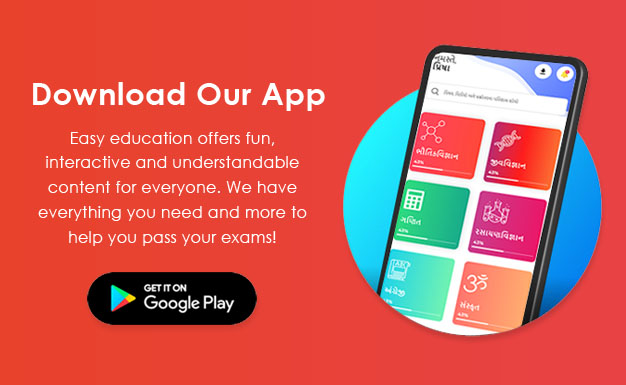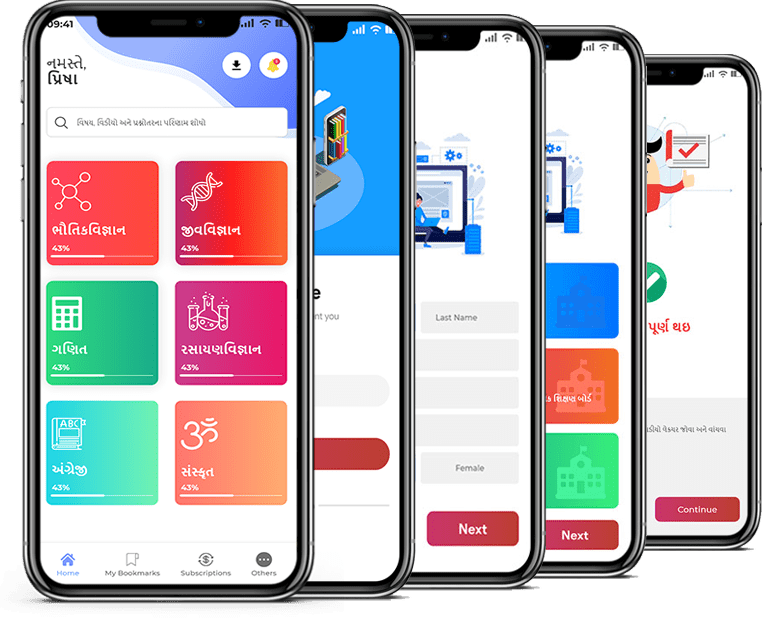GSEB std 10 science solution for Gujarati check Subject Chapters Wise::
જવાબ : Helen's parents were worried because since she was deaf, she did not learn to speak.
જવાબ : Miss Sullivan was a teacher for the deaf and blind.
જવાબ : Helen was seven years old when Miss Sullivan started teaching her.
જવાબ : When Miss Sullivan made some finger movements on Helen’s palm, it was an exciting experience for her.
જવાબ : The first word that Helen learn was ‘doll’.
જવાબ : As the cool flow of the water ran over one hand, the teacher spelt ‘water’ on Helen's other palm.
જવાબ : Touching different objects and spelling their names on the palm awakened Helen's soul.
જવાબ : Helen was connected with the world through words.
જવાબ : If Helen had a question to ask, she would write something on Miss Sullivan's palm and in turn Miss Sullivan would write into Helen’s palm as people talk into a baby’s ear.
જવાબ : Everything around Helen was full of life and joy because her teacher satisfied her curiosity.
જવાબ : The second stage of learning was based on the sense of touch.
જવાબ : Miss Sullivan would speak a word, and ask Helen to touch her lips and throat and in this way Helen learnt to speak through the movements of the lips and the vibration in the throat.
જવાબ : Helen was delighted when she uttered her first word.
જવાબ : After uttering the first word, Helen started talking with her toys, stones, trees and birds in the garden.
જવાબ : Whenever anything delighted or interested Helen, Miss Sullivan would talk about that as if she were a little girl herself.
જવાબ : Helen remembered everything she was taught because her teacher made all the subjects very interesting.
જવાબ : In 1890, at the age of ten, Helen moved to the Perkins Institution.
જવાબ : Helen's loneliness disappeared because she could make friends with the other blind children in the Perkins Institution.
જવાબ : Helen learnt Latin, German and arithmetic at the Perkins Institution.
જવાબ : Moving to the Cambridge School was a great achievement for Helen because she was blind, deaf and could hardly communicate.
જવાબ : A teacher spelled out the questions in her hand and Helen typed out the answers.
જવાબ : Helen knew that there were difficulties in her way but she was eager to overcome them.
જવાબ : The lectures were spelled into Helen’s palms as rapidly as possible and she would note down whatever she remembered when she went back home.
જવાબ : Helen was proud because she was the first deaf –blind person to earn a Bachelor of Arts degree.
જવાબ : The goal in Helen's life was to spread awareness regarding the poor neglected state of the blind, their innate abilities and their inspirations.
જવાબ : Helen had to raise funds not only to sustain a living for herself but also to start projects to remove darkness and miseries from the lives of the other blind people.
જવાબ : Helen was worried because her teacher’s eyesight was worsening day by day and she could not see clearly.
જવાબ : Helen says that her teacher sacrificed her eyesight for her because she ignored her problem and continued to help Helen, and as a result she lost her eyesight completely and became blind.
જવાબ : ‘I cannot think myself apart from her.’ This sentence shows that Helen was very close to her teacher.
જવાબ : The writer was seven years old in 1887.
જવાબ : The name of Helen’s teacher was Anne Sullivan.
જવાબ : The teacher gave her a doll to play.
જવાબ : The writer learnt to speak through the movements of the lips and the vibration in the throat.
જવાબ : Helen moved to the Perkins Institution in 1890.
જવાબ : Helen learnt Latin, German and Arithmetic at Perkins Institution.
જવાબ : Helen wrote her story at the Redcliff College.
જવાબ : John Macy edited Helen’s story.
જવાબ : Helen’s writing was published in a magazine in 1903.
જવાબ : With the game of touching every object and writing it's name on the palm of Helen, Miss Sullivan taught her every day.
જવાબ : When Helen Touched every object around her she was connected with the world.
જવાબ : The Second stage of learning is based on sense of touch.
જવાબ : After learning to speak through the movements of the lips and the vibration in the throat. When Helen uttered her first word, 1t gave her boundless delight.
જવાબ : Helen's sister ran to her when she called her, and her dog obeyed her commands Helen felt amazed and delighted.
જવાબ : Helen was able to speak. That was a miracle.
જવાબ : Helen moved to Cambridge school for Young Ladies in 1896.
જવાબ : Helen was emotionally disturbed because she lost her father.
જવાબ : False
જવાબ : True
જવાબ : False
જવાબ : True
જવાબ : False
જવાબ : True
જવાબ : False
જવાબ : True
જવાબ : True
જવાબ : False
જવાબ : False
જવાબ : True
જવાબ : False
જવાબ : False
જવાબ : False
જવાબ : True
જવાબ : Helen Keller became deaf and blind when she was very young. Since she was deaf, she could not speak. One day, her parents found Miss Sullivan, a teacher for the deaf and blind. On the first day, Miss Sullivan gave Helen a doll and made some finger movements on her palm.
Helen succeeded in imitating the movements correctly, Soon she learnt to spell. She learnt to touch objects and spell their words on her palm. The second stage of learning was based on the sense of touch. Helen learnt to speak through the movements of the lips and the vibration in the throat. Helen also learnt to read and write with Braille as well as ordinary typewriter. She wrote poems and stories. When she joined the Redcliff College, she knew there were difficulties in her way but she was eager to overcome them. The lectures were spelled into her palms as rapidly as possible. She would note down whatever she remembered when I went back home. She was the first deaf-blind person to graduate.જવાબ : Anne Sullivan was a teacher for the deaf and blind. She taught Helen to spell words through finger movements on her palm. She taught Helen to touch different objects and spell their names on the palm. Miss Sullivan satisfied Helen's curiosity.
She taught Helen to speak through the sense of touch. Miss Sullivan would speak a word, and ask Helen to touch her lips and throat slowly. Helen learnt to speak through the movements of the lips and the vibration in the throat. Miss Sullivan made learning more like play than work. Whenever anything delighted or interested Helen Miss Sullivan would talk about that as if she were a little girl herself. She taught Helen to read raised letters and then with Braille. Helen also learnt to type with Braille as well as ordinary typewriter. Even when her eyes became weak, Miss Sullivan continued to help Helen. At last, she became blind. She sacrificed her sight for her student.જવાબ : Helen first learnt to spell words by making finger movements on her palm. Her teacher would make her touch different objects and then spelt their names on her palms. The second stage of learning was based on the sense of touch.
Miss Sullivan would speak a word and ask Helen to touch her lips and throat slowly. Helen learnt to speak through the movements of the lips and the vibration in the throat. Finally she started to read, first raised letters and then with Braille. She also learnt to write with ordinary as well as the Braille typewriter. In Perkins Institution, she learnt Latin, German and arithmetic. At the Cambridge School for Young Ladies, she began to write poems and stories. At the Redcliff College, lectures were spelled into her palms rapidly. She would go home and note down whatever she remembered. She was the first deaf and blind person to earn a Bachelor of Arts degree.There are No Content Availble For this Chapter
Take a Test
I Love You, Teacher
Browse & Download GSEB Books For ધોરણ ૧૦ All Subjects
- વિજ્ઞાન Book for GSEB ધોરણ ૧૦
- અર્થશાસ્ત્ર Book for GSEB ધોરણ ૧૦
- રસાયણવિજ્ઞાન Book for GSEB ધોરણ ૧૦
- સામાજિક વિજ્ઞાન Book for GSEB ધોરણ ૧૦
- ભૂગોળ Book for GSEB ધોરણ ૧૦
- ભૌતિકવિજ્ઞાન Book for GSEB ધોરણ ૧૦
- ગણિત Book for GSEB ધોરણ ૧૦
- ગુજરાતી Book for GSEB ધોરણ ૧૦
- અંગ્રેજી Book for GSEB ધોરણ ૧૦
- સંસ્કૃત Book for GSEB ધોરણ ૧૦
- હિન્દી Book for GSEB ધોરણ ૧૦
The GSEB Books for class 10 are designed as per the syllabus followed Gujarat Secondary and Higher Secondary Education Board provides key detailed, and a through solutions to all the questions relating to the GSEB textbooks.
The purpose is to provide help to the students with their homework, preparing for the examinations and personal learning. These books are very helpful for the preparation of examination.
For more details about the GSEB books for Class 10, you can access the PDF which is as in the above given links for the same.




